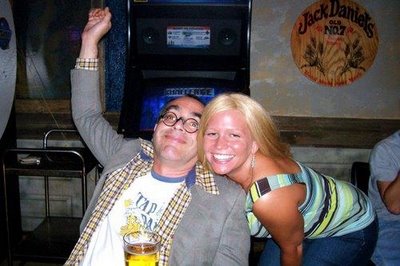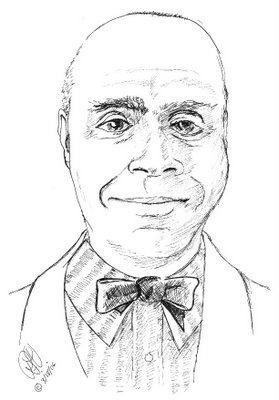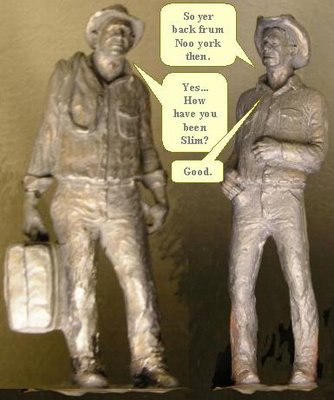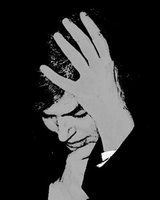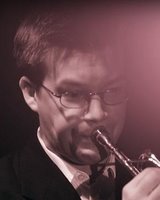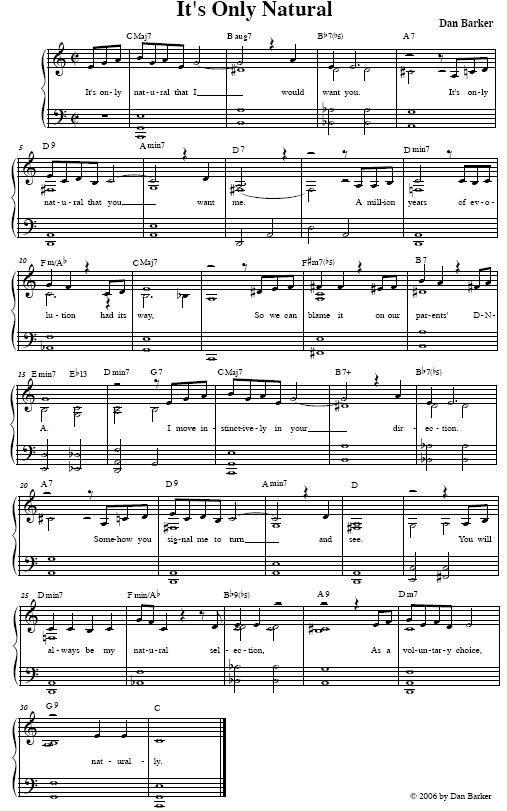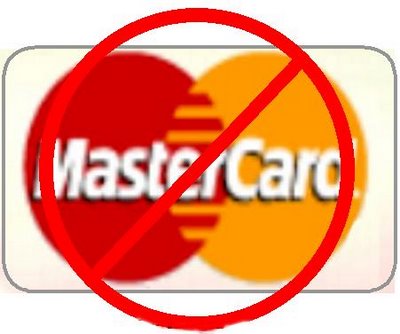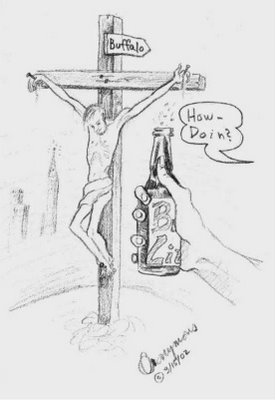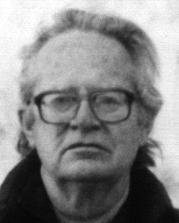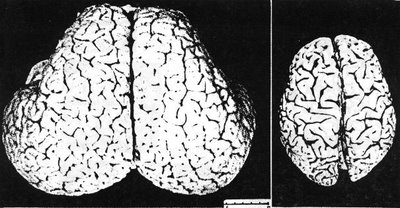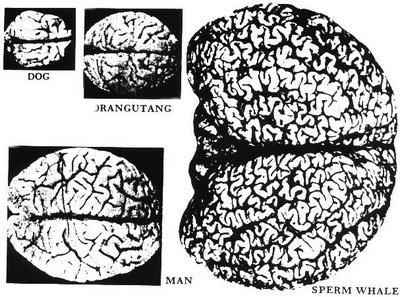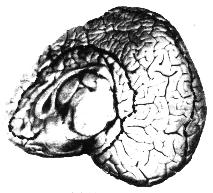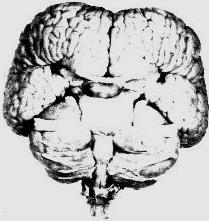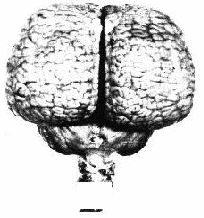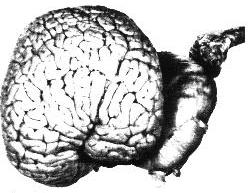When Mr. and Mrs. Jackson first read the ad, they shook their
gray heads in mutual disbelief.
"Too good to be true," Mr. Jackson croaked.
"The schemes these advertisers come up with," Mrs.
Jackson groaned. The newspaper shook in her hands as she moved it
to a distance from which she could read the tiny print through
her bifocals. "You have to admire their cleverness. Or maybe,
their audacity."
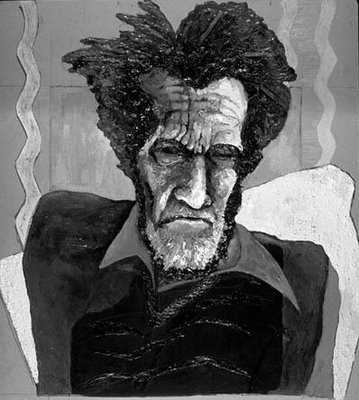
|
|
Image by C. L. Frost
|
|
Mr. Jackson nodded as he swallowed his morning pills
- a scored orange tablet, two green and white
capsules and a pale blue lozenge - with a
mouthful of decaffeinated, artificially sweetened coffee. The ad
reminded him of those he'd read inside matchbook covers and on
the back of comic books in his boyhood. It reminded Mrs. Jackson
of those Elixirs of Everything, secret formulas guaranteed to
cure heart-ache and aging, sold in the housekeeping magazines
that her mother had read for decades; newer magic potions, those
offered nowadays, added "lost medicines of the Incas" and
"remedies derived from recently discovered esoteric Hindu
teachings" to the concoction. She cleared the phlegm from her
throat and began to read:
"Deal of the Century! First annual Gray Sale, for senior citizens
only. Amazing discounts! Lazy-Boy loungers with kid leather
upholstery, only $25. Big screen TVs, only $30. Golf carts, only
$10. Do you live on a fixed income? Trouble affording that
computer you want to buy your grandson? That piano for your
granddaughter? New laptops only $50. Baby grands, and a year of
free music lessons, only $100. Want to help your daughter remodel
her kitchen? Refrigerators, all sizes and colors, just $50;
ranges only $40. Everything must go, all prices slashed. First
300 shoppers win a free Caribbean cruise, two weeks in January
aboard the Merit Fleet's premier luxury liner.
First 500 win a free hot tub, guaranteed to sooth aching joints.
Merchandise limited; come early before inventory's gone. Sale one
day only - Saturday, September 1st, 10 AM
- 8 PM at the Paradise Emporium on Rte 8 at
the Elmsbury fair grounds."
Mr. Jackson reached for the paper and squinted at the miniscule,
faint print that his wife couldn't see.
"Discounts are made possible by funding from the federal and
state governments," he read aloud. "Plus a long line of insurance
companies." He paused. "I wonder what the catch is."
"Some trick, for sure." Mrs. Jackson licked her parched lips and
sipped tea to wet her mouth before continuing. "We'll get in
there and find bargain basement clothes with designer labels
- look-alikes until you examine the seams,
which are already unraveling. Or big boxes of cereal that look
like they could feed an army, but with hardly enough inside to
fill a baby's breakfast bowl. If there's a
baby grand, it'll probably be made out of
plastic and small enough to fit in a dollhouse. The golf
cart'll have torn sides and rusty wheels
- dragged there straight from the city dump.
Probably another scam to fleece us old biddies.
Aren't we all dim witted? Isn't everyone with
wrinkles and bad knees senile? An easy mark?
Don't we all drool over our pudding, dribble
Ensure over our bibs and wear adult diapers?"
Mr. Jackson nodded as he placed a red check mark in the upper
left corner of the calendar box for Wednesday, to indicate that
he'd taken all his morning medications.
"And I never heard of altruistic insurance companies," he
muttered. "But, we have a few days until the sale; maybe enough
time to find out what really lies behind that ad."
When Mr. and Mrs. Jackson left the house to investigate, they
found that all the senior citizens were talking about the sale.
Maxine Stritch, the bony seventy-five year old neighbor who
lovingly weeded her garden daily despite her arthritis, seemed to
bounce on tip-toes; excitement had sucked the pain out of those
knobby joints. Anna Difrancesco, the baker's widow, gestured
enthusiastically; her plump but agile hands drew arabesques in
the air. Tom O'Toole, raconteur and retired electrician, spoke
faster and faster, until he began wheezing and perspiration
beaded on his reddening scalp.
"The Gray Sale? Of course I'm going!" exclaimed Maxine. "I'm
getting there early, 6 AM. Maybe 5 AM, with a fat pillow and a
blanket to camp out in front of the door. I want to be one of the
lucky three hundred, spend winter basking under the hot Bermuda
sun. And my grandchildren want their own computer, not just
scheduled time on their parents' machine; they
keep asking for one, but you know how much you can buy on a
school teacher's pension and social security. So, this is a
windfall - if I can beat the lines."
"It's the deal of the century!" Anna's large brown eyes sparkled
like those of a restless adolescent in love.
"Haven't you seen all the commercials? Every
fifteen minutes; they've been advertising for
weeks. Just one dollar gets you a raffle ticket for a Cadillac
- straight out of the factory, shiny new, any
color you want. And they're giving away two
hundred. Two hundred! Winners'll be announced
just before closing, and I'll be in there,
waiting; I'm driving out of there in a
sparkling new, hot pink Money-Mobile. Even if I
don't win
-" She paused to pat her
thick gray hair into place. "Everyone always
laughed at me for keeping Alfie's truck, the one he used for
delivering breads and cakes. 'What's a widow-lady going to do
with that big clunker?' they wanted to know. Well, come Saturday,
they won't be wondering any more. With everything selling cheaper
than week-old pumpernickel, I'll be pulling every credit card out
of my purse and thanking the gods for plastic money. Don't need
it this year? I might need it next year. Not sure if I can use
it? One of my kids or grandkids might use it, and like it for a
gift. No excuse not to buy, and that truck holds a lot of stuff.
If they sell big TVs and Lazy-Boy Loungers with suede cushions,
I'll be storing a new living room in there. Not a Junk-mobile
- now it's my
treasure-mobile."
"Of course it's real!" laughed Tom. "My son, the one in city
council, says they've been planning this for months. Most of the
nursing homes are renting vans to take their residents to the
event; some didn't want to at first - with all
the liability issues, what if Joe Nasty's Grandma gets trampled
by the crowds? - but the residents got too
excited when they heard about what was coming, demanded to go and
threatened to beat the administrators with their canes if they
were kept in. The big city's chartered special buses to drive us
golden oldies to the sale; the city papers have been advertising
Paradise Emporium for almost a year. Buses with fat velvet
cushions and seats that recline, for us oldsters with bad backs.
Pick-up at our own front door, if you so request. A nurse on
every bus, just in case. And other cities and towns, every one
that's less than a hundred miles from the fairgrounds, has plans
for transporting its seniors."
Tom paused to catch his breath and wipe the sweat from his shiny
pink scalp; then, grinning like an aging leprechaun, he inhaled
deeply.
"On September 1st," he mused, "Hundreds of buses, all filled with
grannies and grandpas wanting to shout a Hip-hip-Hooray camp
cheer, will speed down Route eight. Pity any policeman who dares
to stop one of those buses! The passengers might beat that cop
bloody with their walkers, strangle him with their Foley catheter
tubes, sting him with the insulin needles they carry concealed in
jacket pockets. Folks'll get feisty, even the sick ones;
don't keep us from the Mall-of-all-malls! And
can you imagine the evening headlines? 'Cop attacked by mob of
seniors, who behave just like teenage hooligans.' Might be the
start of a new movement; we might see laws describing canes and
catheters as lethal weapons."
That day and the next, Mr. and Mrs. Jackson toured the town,
speaking to old people whom they knew already and old people who
were strangers. They drove to the Senior Activity Center in the
long, wide Ford they'd bought during an era when they thought
they'd live forever; with many replaced parts, the lovingly
waxed, lemon-yellow car was almost as old as their marriage. They
entered Sam's Deli, favored by seniors because it was owned by
one capable man as old as themselves and staffed by family
members who knew every customer's name: while slicing cheese or
spreading lox across warm bagels, Sam would chat about politics
or the marital problems of a grandson who lived on the other
coast. They strolled into Tony's Foods, the last individually
owned grocery in an age of chain supermarkets filled with glaring
fluorescent light and clerks trained to smile robotically through
their indifference; at Tony's, the amber light softened craggy
profiles and treated old eyes gently, and the
proprietor's warm welcome made even an old
person feel that he was still human, not yet an invisible ghost.
Sam's Deli and Tony's Foods would be closed on Saturday; Sam,
Tony, and most of their patrons planned to spend the whole day at
Paradise Emporium. Sam even proposed making September 1st a
holiday, National Geriatric Day, to be celebrated with parades of
costumed marchers wearing masks of wrinkled faces with sagging
jowls and thin lips; the marchers might dance nimbly around
walkers and twirl canes like batons while high school bands with
off-key tubas played favorite old tunes.
"Ideally," Sam winked at Mrs. Jackson, "The band would play
perfectly. But, have you ever heard a high school band with all
the horns on key? Doesn't exist! So, we soothe our nerves,
jittery from all that bad playing, with gourmet feasts cooked
without salt and entirely with low cholesterol, antioxidant-rich
foods. Sorry, none of my prime Mozzarella on Old Age Day!"
Tony glanced at the personally stocked shelves in his store and
shrugged.
"I'd close the shop
anyway," he said as he fixed price labels to cans of
tomato soup. "Want to get Timmy that bike
he's been asking for all year;
they're selling ten-speeders for thirty bucks.
But who'd come here anyway, even if I kept the
place open? No one - not when
they're offering a free all-you-can-eat
lobster buffet at five, and a big band playing Glenn
Miller's greatest hits. Lobster! I
haven't tasted it in years; buying it is like
buying diamonds. So I'll be there all day,
mouth watering."
Early each evening, Mr. and Mrs. Jackson returned home exhausted
from their rounds of listening to old people enthuse about the
Sale-to-beat-all-Sales at the Paradise Emporium; no one asked why
the government and insurance companies would treat the elderly so
charitably. Mrs. Jackson called her friends from the Senior
Activity Center. Mr. Jackson called his poker buddies
- five limping, sometimes incontinent,
stiff-jointed but sharp-eyed men who formed his "circle of
curmudgeons".
"Everyone else is going," Mrs. Jackson said on Friday night, as
she ladled rice and peas onto her plate. "I usually don't like
crowds, but I wouldn't want to miss a great event."
Mr. Jackson placed a green check mark in the lower left corner of
the calendar's Friday box, indicating that he'd taken the scored
orange tablet, the crimson capsule, the two green and white
capsules and the huge tan pill prescribed for dinnertime; the tan
pill always scratched his throat, stuck in his esophagus and
squeezed into his stomach only after several gulps of water. He
added a check mark to the lower right corner, indicating that his
wife had also taken her evening medication.
"Jeff - the guy with the colostomy bag," he
began hoarsely, "Jeff's excited about the sale; he's going with
his sister, who's staying at his place overnight and drove six
hours to get to the event. Ned, the one with gout who sees
through my poker face every time and says that I'm too bad a liar
to ever play at real poker; penny poker's it for me, as high as
I'll go. Well, Ned thinks that the politicians recognize how many
people in this country are over 65; we're a big voting block, can
make or break a candidate. So, the politicians want to get on our
good side. 'Make nice to the seniors,' they say, 'If you want to
keep our seat in congress.' So, we're right to question the
motives behind this Paradise Emporium. They're not really giving
charity; they expect us to repay them at the ballot box. But,
that doesn't mean that we can't enjoy the spectacle and
capitalize on a few bargains."
Mrs. Jackson crushed a pea under her fork and watched the pulpy
green interior ooze up between the prongs.
"It's probably just my overly cautious nature that makes me
uneasy," she said, and reached for her teacup. "Maybe
I'm too skeptical, too conservative. Sometimes
you have to trust people and take risks to get the most out of
life."
"So true," Mr. Jackson mumbled, then swallowed his mouthful of
rice. "I had my doubts too. Big doubts. But if the curmudgeons
are eager? Some of those guys wouldn't trust a
little kid peddling Girl Scout cookies; they act as though
everyone's trying to sell them land on the moon. If they don't
sense anything wrong, neither should I. Any unease is just my
suspicious nature acting up." He cleared his throat and spoke
more loudly. "So, what time tomorrow do we leave for Paradise?"
Mrs. Jackson shrugged.
"Whenever," she sighed. "When we've finished breakfast, had our
warm showers and feel ready. No reason to get up early for the
mad rush; we need our sleep. Besides, where would we put a hot
tub?"
The next morning, after a breakfast of oatmeal and Ovaltine, Mr.
and Mrs. Jackson drove under a bright, high sun to the Elmsbury
fairgrounds. Yellow police tape and sawhorses blocked off roads.
Filled parking lots gleamed as metal reflected the white
sunlight; to Mrs. Jackson, the snugly aligned cars resembled
nesting beetles. A policeman stopped the yellow Ford and directed
the Jacksons to a lot three miles away; a shuttle bus drove them
back to the fairgrounds and deposited them at the end of the line
of people awaiting entry into Paradise Emporium.
"It's a tent!" Mrs. Jackson exclaimed when she saw
the white fabric arced between steel poles and rigging. "It looks
like a series of snowy mountains. And the line
- there must be five hundred people between
here and the entrance."
Mr. Jackson sighed as he considered the long wait ahead of him,
pulled a tube from his pocket, rolled up his trousers and rubbed
analgesic cream onto his knees. Alerted by the whiff of menthol,
Mrs. Jackson reached for the tube, then rubbed the ointment into
her lower back. A monitor in white trousers and a navy jacket
stitched with gold brocade on the cuffs and pockets, one of at
least fifty patrolling the grounds, sniffed, strode briskly to a
ramp, then rolled two plushly cushioned chairs towards the
newcomers.
"We want you to be comfortable,"
the monitor said as he patiently helped Mr. and Mrs. Jackson into
chairs. "No reason to strain those joints while
you wait."
A cheery hostess pushed her cart parallel with the line, stopped
before the Jacksons and offered to pour them glasses of cider,
bottled water, sugar-free lemonade, or iced tea.
"We also have finger sandwiches and three
kinds of soup, all cooked with low cholesterol products, if you
get hungry." The hostess, as slender and professional
as an airline attendant, smiled at the Jacksons.
"When the line moves forward, you can stand up
and push your chair; it has wheels. But if
you're tired, you can flip this switch and
activate the motor; you can navigate by pushing this lever, let
the chair roll you forward and do all the work. It
doesn't move very fast, so you
won't bump into anything. Besides, a
monitor's always watching; one of us will be
there if you look like you're going to hurt
yourself. If you need anything, if you need something to drink or
need to use one of our bathrooms, just push this big button. A
monitor will see the blinking lights on the sides of your chair
and come to help you. Any questions?"
Mrs. Jackson shook her head. Mr. Jackson activated the motor, let
the chair wheel him back a foot, then returned to his original
position; a light nudge moved the lever.
"I wouldn't mind having a
chair like this at home," he marveled as he sipped
spicy warm cider. "And if I turn this knob, the
bottom slides out and I get a foot-rest; I can keep turning to
raise and lower my legs. The people who organized this event
understand how old feet need to be propped up."
Mrs. Jackson let Seltzer water bubble over and clean her tongue.
Overhead, a lone cloud floated nonchalantly in the crayon-box
blue of one of late summer's perfect days.
Sunlight caressed her, warm but not hot; breezes cooled, but
didn't chill, her. An ambulance idled silently
fifty yards away, medical care available for anyone who needed
it. The door of one of the many Porta-potties opened and a
uniformed monitor helped a hunched woman back to her seat.
Meticulously coifed hedges, with not a branch out of place, lined
the fairgrounds' perimeter. Closely cropped
grass extended as far as she could see, like a green carpet; Mrs.
Jackson couldn't smell pollen or the pungent
aroma of fresh lawn clippings. The day was just right.
"Yes, they planned well, thought of
everything," Mrs. Jackson approved.
"I never expected refreshments or seating. At
least we'll be comfortable, even if the
line's bad."
A scrawny man, just ahead of the couple in line, rotated his
chair to face them.
"You think this line's bad? You should have been here at 5 AM,"
he grunted. "We're the last stragglers. One of the caterers told
me that people started arriving before midnight; by 5 AM, the
line was four miles long and spiraled around the tents eleven
times. But, at least the Paradise staff was prepared. The
monitors were already out here, offering people chairs and
handing out blankets to anyone who wanted to sleep." He paused
and glanced down apologetically. "Sorry for not
introducing myself; you'd think that I left my
manners back in the office when I retired. I'm
Dan. Glad to meet you, it's always good to
meet someone in the line to Paradise."
The hostess stopped her cart beside a plump woman who offered to
show her pictures of the grandchildren; she examined the frayed
photos and praised each. The grandchildren were all so beautiful
and charming, had faces that could be on TV, obviously made
Grandma proud; the hostess sang out her praises rhythmically, as
though energetically reciting a mantra. Mrs. Jackson unzipped her
purse; the snapshots of her own grandchildren, tea stained and
years out of date, lay at the bottom of the bag, under the pill
jars, brush, comb, compact mirror and pounds of spare change. Mr.
Jackson wedged his hand into his pocket, feeling for the wallet
where he stored his driving license, social security card, family
photos and other valuable documents in plastic compartments.
"They didn't need to call in police reinforcements until 10, when
the place opened for business," the round-faced grandmother
suddenly trilled. Finished with displaying her photos,
she'd swiveled her chair to face the Jacksons;
she drank her lemonade quickly and relaxed into her cushions. "A
few people tried to cut through the tent, unsuccessfully because
the fabric's so strong, but most people waited
patiently through the night and early morning. Napped, played
cards with the people near them, embroidered, wrote letters; all
peaceful and quiet, what you'd expect from a
bunch without much fuel left in them."
The woman pushed down the white corner of a snapshot that poked
up above a rim of fabric, then patted her pocket to be sure that
all her grandchildren were safely in place.
"But, when the flaps opened,"
she continued, "A crowd stampeded forward.
Rushed, as much as they could rush. Maybe only 25 or 30
troublemakers, but twenty-five's enough to
bring in the cops. I don't know where those
folk found the energy, they must have ignored their bad tickers
and all the doctors' warnings. An amputee got
pushed to the ground; one man charged at the ambulance crew with
his wife's knitting needles when they cut in
front of him. A woman from far back in the line stormed away,
then tried to ram her car through the side of the tent fifteen
minutes later. She sat very low in the driver's seat, her head
barely visible through the side window; a man fainted when the
hell-car sped forward, seemingly driven by its own
will."
Mr. Jackson, noticing that the plump lady wore sunglasses, rubbed
his own eyes, which teared in bright light.
"Typical crowd behavior," he sighed, then turned to his wife.
"The tent makes sense - easy to put up and
take down. How many people do you think it holds?"
Mrs. Jackson shrugged.
"It could hold several football stadiums," Dan replied.
"That's what? - thirty
thousand people? A hundred thousand? Four, maybe six, miles of
people have snaked their way in."
"And no one's come out," the round-faced woman added.
"No one's left," Dan agreed. "We'd see them. That dark opening at
the far left, that's the exit. But no one's come through there,
not even a janitor."
Mr. Jackson didn't ask the man how he'd distinguish an exiting
customer from a janitor. He didn't ask why
none of the shoppers had left yet; the bargain hunters would be
trapped inside by their own greed. Instead, he drew circles in
the air with the toe of his raised shoe and tried to resign
himself to waiting. Mrs. Jackson shifted the heavy purse on her
lap from her right thigh to the left, then back to the right; the
mounds of coins clinked as they thudded from side to side and the
stiff vinyl edges dug into her skin.
"A shame that we didn't bring magazines," Mrs. Jackson said after
a while.
"A shame that we don't have a deck of cards.
Nothing better than a game, penny ante, to help you get rid of
those coins at the bottom of your purse; you
wouldn't have to jingle whenever you move,"
Mr. Jackson replied.
The two folded their arms across their chests and gazed ahead,
vision blurred and thoughts slowing as they made ready for a long
wait.
"No more allowed inside for now, the tent is
full," a monitor, flanked by a burly policeman,
announced into a microphone. "We sincerely
apologize to all of you, who've been waiting
so patiently. We hope to admit many more of you, all of you
eventually, as soon as some shoppers leave. As a consolation
prize, we offer all of you a choice of
free--"
Several from the front of the line stood abruptly and marched
towards the tent; others, limping and shuffling behind them,
yammered protests.
"Stand back!" The cop barked and
blew his whistle "Wait here or come back in
three hours!" Seeing that the old people
wouldn't obey, he retreated a step and
frantically beckoned to his fellow officers. Five policemen
silently moved into guard position between the crowd and the
tent. A German Shepherd bounded towards the entrance, its taut
muscles rippling; a cop gasped to keep up, gripping the leash in
one fist while clutching at the holstered gun that his jiggling
belly threatened to dislodge.
"Three hours!"
"You keep us waiting all this time, and then
you turn us away?"
"And in this hot sun! It may seem balmy to
you, but 'balmy' becomes hot
when you wait and get nothing!"
"I thought this operation was organized.
What's with you people?"
Many in the crowd grumbled and muttered reedy curses: Damn
them, they can't just toss us out like bags of
rotting old garbage! But what can we expect,
isn't it always like this for us, the
dispensable ones, the faceless leftovers? Some hissed; the
most energetic hollered. A woman shrieked and hurled a bottle of
Aspirin at the policeman; another kicked him with the
steel-reinforced instep of her orthopedic shoe and scratched at
his face with brittle nails. A whistle screeched; a dropped radio
crackled static under pounding heels. As more police rushed
forward, old men brandished metal walkers and swung their canes.
"Who are the old farts now?" a
raspy tenor yelled. "You're
the old farts - full of hot air promises!
Chasing us away after we've stood here all
this time. And with our heart conditions and asthma? How fair is
that, you good-for-nothing windbags, to let us risk our health
and then get nothing in return"
"You'll get in, just a
little later. Lets not start a riot here, a little extra time in
line isn't worth a riot," the
monitor intoned in a velvety baritone.
"We'd let you all in now.
But we can't. It's a matter
of safety codes; regulations limit how many can occupy the tent
at one time, and we have to obey the law." He glanced
nervously at the cop beside him, a lanky redhead this time, then
continued in a slow voice as rich and soothing as molasses.
"I know that regulations
don't mean much when you've
been waiting so long, when you're tired,
disappointed and furious. I've been in your
situation - not for something as big as this,
but for something that was very big for me -
and I felt like ripping the tongue out of the manager who made me
wait: I wanted to skin him alive. So, believe me, I know what
you're feeling. No, we
can't give you back the time
you've lost to waiting. But, perhaps, we can
offer you proof that our apologies are sincere. Our hostesses
stand ready to pour you Champagne, scotch, gin, red wines and
beer; they'll also be serving crab salad and
shrimp cocktails, originally intended for the buffet, to help you
through your hunger. And one of our musicians, a virtuoso
violinist, has agreed to leave the tent and perform especially
for you - any tune, a classical piece or a
love song from your honeymoon days, just ask and
he'll play what you desire."
The angry old people stopped, looked at each other, shrugged and
nodded, and began trudging back to their chairs; drained by their
outburst, they shuffled more slowly and paused more often to lean
into their canes and catch their breath.
"They have a point…about
regulations," one stooped man muttered between gasps
for air. He inhaled deliberately, wheezed out a cough, then wiped
the sweat from his ruddy cheeks. "When I was a
carpenter…everything was
codes….Had to obey the
codes…or get run out of
business."
A plump woman, who still bothered to dye her hair, spoke, then
glanced up at her husband, then continued speaking as she fixed
her gaze on the ground in front of her.
"Champagne's not so
shabby," she reassured. "You have
to admit, they're doing their best to make a
bit of bad luck as pleasant for us as possible. And a violinist
especially for us! Maybe we can get him to play that Italian love
song we liked so much when we were courting; I wish I could
remember the name, but if we hum a few bars,
he'll probably know which song we want. Just
thinking about it takes me back, makes me feel like I could dance
across the floor with my skirt whirling and the pearls swaying
back and forth across my chest."
The husband grunted.
"Violins don't make me
feel young again." His fingers rose to a plastic
button in his right ear.
"Don't hear the high notes
like I used to. But crabmeat -
that's special by itself; how much does it
cost at the store, when they even bother to stock it? I guess the
Paradise people do have something for everyone, even during an
emergency."
The old people sank back into their motorized chairs. Some
chatted with those waiting near them, the first strangers
they'd befriended in years. Some merely closed
their eyes, hoping to absorb energy from the warm, restorative
sunlight.
"Don't let them fool you,
even if they look peaceful now," a cop stationed at
the back of the line warned an officer near him.
"They're like old cats
- a bit slower, but they still have claws and
teeth. Old cats can be cranky and unpredictable. And some of them
don't know they're winded
and creaky until after they've
attacked."
Mrs. Jackson turned to her husband.
"We don't really want to
wait around, do we? It's almost two-thirty;
Mike's coming at three. We
don't want to keep him waiting, do we? Not
when he's going off to college in a week; we
might not see him again for months."
Mr. Jackson shook his head; he, too, would miss his youngest
grandson.
As the couple strolled south, hoping to meet a bus that would
drive them to their car, an inconspicuous man in an attic two
blocks away pushed a button.
"Mission DebtKill complete," he
muttered into a phone as the first flames shot up and shock waves
from the explosion knocked the Simpsons to the ground.
In a room far away, government officials and CEOs heard the
message over a speakerphone and sighed in collective relief. From
this, and thirty other Paradise Emporium sites scattered
throughout the country, the same words were broadcast: Mission
DebtKill complete.
"So, how many do you think we
got?" the director of military operations asked.
"I know that we'll have to
wait for a body count, plus missing person reports where the
remains are too charred to be recognizably human. But, as a best
guess - a few million?"
"Whatever, it's a big
step forward in debt reduction," a CEO asserted.
"Big savings for everyone in the long run.
We'd have to pay out life insurance premiums
anyway, but at least we can bypass all the health insurance
payouts. Not to mention the savings for the Medicare and Social
Security people. Maybe we missed ten or twenty percent of them,
mainly the ones who are ready to die anyway or a few who are too
rich to be lured out by anything - but
they're not the ones who'd
cost us in the future."
The men in that room raised glasses of champagne in a toast to
the success of their plan.
In a hospital near the Elmsbury fairgrounds, Mr. and Mrs. Jackson
winced as ER doctors treated their superficial burns and pulled
metal splinters from their skin. Both remembered only a sudden
roar and a blast of heat.
"You suffered mild concussions,"
the doctor told them. "But
you're both very, very lucky. The explosion
killed everyone in that tent, and most of the people near it; now
there's just a big crater in the ground where
it stood. If you hadn't already walked quite a
distance away, you'd have been killed
too."
"It's on all the news
stations," a nurse fretted. "Maybe
fifty thousand killed in that explosion. And not just here
- also near Atlanta, near Dallas, near San
Francisco. Someone targeted all thirty Paradise Emporium tents;
all the sales were scheduled for today, and all the tents
exploded when they were filled with shoppers. The
government's blaming
terrorists."
Mr. and Mrs. Jackson, the doctor and the nurse gazed solemnly at
one of the televisions mounted in the ER and strained to hear the
reporter over the din. Probable terrorist
attack….We know where the terrorists come from,
even if no one can prove their identity; in a country at war,
everyone knows who the terrorists are….In
outrage, the nation mourns this slaughter of its esteemed
elders.
Mrs. Jackson cringed as she imagined Maxine and Anna hunched over
booths, examining potted saplings and glittering trinkets seconds
before the detonation. Maybe Maxine had tripped in her garden and
been kept away by a limp. Maybe Anna couldn't
start the Junk-mobile, and missed the explosion while waiting for
a mechanic to adjust the carburetor. Maybe an asthma attack had
kept Tom O'Toole home. But, as a lifelong
realist, Mrs. Jackson didn't sustain herself
on hope; she tallied up the odds and guessed at what was
probable. Suddenly, the red patches on her skin felt very raw and
hot.
"I was uneasy about that
emporium," Mr. Jackson stammered as they walked out
of the hospital. "Maybe suspicious for the
wrong reasons. But terrorists bombed the place. Terrorists! I was
right to feel uncomfortable."
Mrs. Jackson nodded.
As they drove past the closed door of Tony's
Foods and the dark windows of Sam's Deli, Mr.
Jackson felt his stomach lurch. He imagined the curmudgeons
picking over fishing reels and examining decks of cards with a
magnifying glass while debating whether or not to buy. At home,
he dialed each number from his list, then listened to jarring
rings or to a gruff voice from the dead asking him to leave a
message.
"It's just you and me
now," Mrs. Jackson said after a long silence at
dinner, as though reading her husband's
thoughts. Both pushed cooling spaghetti listlessly across their
plates, then dumped the uneaten meal in the garbage.
A week later, the town held a memorial for the victims. At the
ceremony, Mr. Jackson learned that one of the curmudgeons, Andy,
had survived; an angina attack on the first had confined him to a
hospital bed.
Two months later, Sam's family moved away and
sold the delicatessen to a fast food franchise. A realtor moved
into the space once occupied by Tony's Foods.
Young people chatted merrily on streets that looked unchanged to
them; they noticed the same shops and the same people as before
the disaster. When they passed the crater at the fairgrounds,
they vaguely recalled that this was the site where many old
people had died. But those old people lacked faces or voices;
they were members of a foreign species, invisible and unheard,
except when they tugged at pockets for a handout or demanded that
a wheelchair be pushed.
"I wish we could move," Mrs.
Jackson sometimes said.
"But where could we go?" Mr.
Jackson replied.
Mr. And Mrs. Jackson forced themselves to shop at the supermarket
with too many brands and too many lights; they forced themselves
to swallow morsels of food that always tasted bland. They made
themselves watch the evening news and sit for dinner at 6 PM,
routines that meant they were still alive and human, even if the
food went uneaten and they stared unhearing at the screen.
Several other old people had survived, but the Jacksons
didn't try to find them. Their joints ached so
much more, possibly due to their new gauntness, and their people
were gone; they needed a good reason, an unavoidable chore,
before they'd go into this new town of the
young. A wan sediment of dust settled over their furniture; the
leaky faucet dripped rhythmically, marking minutes and hours.
Only Andy ever visited; Andy had been coming for years, belonged
to the old life and the old town.
A year later, Mr. and Mrs. Jackson read an ad for the Hall of
Hope, featuring a "funhouse extravaganza
designed for the handicapped; a garden of delights for the deaf,
the blind, the crippled, the cognitively challenged. Only the
handicapped admitted, free of charge due to the generosity of our
sponsors. A one day event only, at the Elmsbury fair grounds
along Route eight."
Mr. Jackson passed the ad to his friend Andy.
"Would you go to this?" he
asked.
Andy read and shrugged listlessly. "Yeah,
maybe, if I was handicapped. Who knows? It's
free, not expensive like those amusement park rides,"
he mumbled. "So, what's to
lose?"
When Mr. and Mrs. Jackson went to the supermarket, they found
that everyone in the checkout line was talking about the Hall of
Hope.
"Makes me almost wish I were
handicapped," a woman with garishly colored curls
twittered. "Who'd miss a
chance to have this kind of fun? And all - for
nothing!"
"If I had any kind of
disability," a portly man asserted,
"I'd be there at dawn with
my handicap-ticket. Even if I had a little disability
- I'd be there with the
doctors' certificates or school records
testifying that I deserve admission. I might have two legs, but
I'm handicapped all the same; this form proves
it - so move over, Buddy, and let me
in!"
"There's that home for
the retarded at the end of my block," another shopper
added. "Those kids - hardly
kids, most of them are in their thirties -
they go to the sheltered workshop every day, then come back to
eat and sleep. There's not much excitement in
their lives; a Hall of Hope funhouse would do those kids good.
And my sister, who's teaches special Ed and
knows about these things, says that there are millions of people
in this country with serious disabilities. Those people need a
little hope."
Simultaneously, Mr. and Mrs. Jackson felt a cold shiver of
premonition tingle through their spines, and glanced at each
other.
"It's just you and me
now, we're alone together in
this," they thought in unison.
